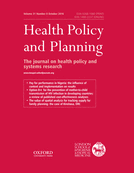
Urbanization and human health in urban India: institutional analysis of water-borne diseases in urban India’
Subramanian, Saravanan / Marissa Ayessa Idenal / Shahin Saiyed / Deepak Saxena / Solvay GerkeExternal Publications (2016)
in: Health Policy & Planning 31 (8), 1089–1099
DOI: https://doi.org/10.1093/heapol/czw039
Open Access
Diseases are rapidly urbanizing. Ageing infrastructures, high levels of inequality, poor urban governance, rapidly growing economies and highly dense and mobile populations all create environments rife for water-borne diseases. This article analyzes the role of institutions as crosscutting entities among a myriad of factors that breed water-borne diseases in the city of Ahmedabad, India. It applies ‘path dependency’ and a ‘rational choice’ perspective to understand the factors facilitating the breeding of diseases. This study is based on household surveys of approximately 327 households in two case study wards and intermittent interviews with key informants over a period of 2 years. Principle component analysis is applied to reduce the data and convert a set of observations, which potentially correlate with each other, into components. Institutional analyses behind these components reveal the role of social actors in exploiting the deeply rooted inefficiencies affecting urban health. This has led to a vicious cycle; breaking this cycle requires understanding the political dynamics that underlie the exposure and prevalence of diseases to improve urban health.

